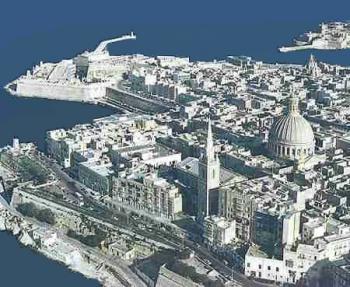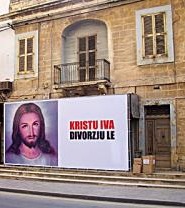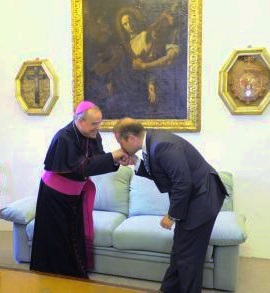 Where Church and state are intertwined
Where Church and state are intertwined
In Malta Roman Catholicism is the state religion with the constitutional right to morally instruct the nation. Therefore the Church felt justifed in lobbying in the 2011 referendum on legalising divorce. However, despite a manoeuvre which disenfranchised the youngest voters, the “yes” vote squeaked through and parliament passed a bill permitting divorce. This brought Maltese law into conflict with the Vatican agreement. forcing the renegotiation of the Marriage Concordat.
 This microstate off the coast of Sicily may well have more concordats per head than any other country in the world. In the decade from 1985-1995 it acquired ten concordats, perhaps not surprising for a nation that was once owned by a Catholic religious order, the Knights of Malta
This microstate off the coast of Sicily may well have more concordats per head than any other country in the world. In the decade from 1985-1995 it acquired ten concordats, perhaps not surprising for a nation that was once owned by a Catholic religious order, the Knights of Malta
In 1530 the Charles I of Spain gave the islands to the Knights in perpetual fiefdom in exchange for an annual fee of one Maltese falcon. The island was regarded as an outpost of Christianity and the huge fortifications of the capital, Valletta, were built with funds from the pope and the Catholic kings of France, Spain and Portugal, in order to discourage further attacks by the Ottoman Turks. [1] In 1630 the pope awarded the Grand Master of the Knights of Malta equality with a cardinal of the Catholic Church. The Maltese ruler was henceforth addressed not just as “Your Highness”, like a king or “Your Eminence” like a cardinal, but as “Your Most Eminent Highness” — a perfect expression Malta’s unity of church and state.
Until 1814 Malta was “governed” by three church authorities: the Grand Master, the Bishop and the Inquisitor. [2] Then the treaty that ended the Napoleonic wars gave Britain these strategic islands between Gibraltar and Egypt. The British ended the Inquisition, but for forty years retained the authoritarian laws of the Knights of Malta. [3] Even under British rule most Maltese marriages fell under canon law. This was due to the Simmons-Rampolla agreement between Britain and the Vatican, the only UK - Vatican “concordat” in history. The UK agreed that canon law should apply to any marriage celebrated in Malta in which one or both parties were Roman Catholics, otherwise the marriage was invalid. [4]
Catholic Church written into the constitution
Even today, church and state remain intertwined. In Malta Catholicism is the state religion (as it is in three other tiny European states: Lichtenstein, Monaco and San Marino). Malta’s Constitution (1964) enshrines this in Article 2:
- The religion of Malta is the Roman Catholic Apostolic Religion.
- The authorities of the Roman Catholic Apostolic Church have the duty and the right to teach which principles are right and which are wrong.
- Religious teaching of the Roman Catholic Apostolic Faith shall be provided in all State schools as part of compulsory education.
In other words, the Catholic Church has a constitutional right to instruct the nation about what is right and wrong. In line with its adherence to Catholic doctrine, Malta secured an exemption when it joined the European Union (Protocol 7) in order to maintain its absolute ban on abortion.
Until 2011 Malta was also unique in the European Union for not permitting divorce. Even couples who married in civil ceremonies — first permitted in the mid-1970s — could not get divorces in Malta. This meant that the seven per cent of Malta’s citizens who were separated could not remarry. Before the referendum a brave Monsignor came out in favour of allowing divorce to ease the suffering of those denied the right remarry, and help their children. [5]
Church influence over the judiciary
The referendum on divorce was held under the shadow of widespread and longstanding charges abuse of children by priests. Until 2011, the year of the referendum, none of these had led to convictions by the civil authorities. The Church said that it had received 84 allegations of abuse involving 45 Maltese priests in the previous 11 years [6] and its own investigation dragged on for more than seven years. The “punishment” finally meted out by the Vatican to the 13 priests that it felt were guilty “varied from not allowing them to exercise their ministry to limiting their pastoral work so that they could not work with minors and being placed under supervision”.
At the same time a criminal court case was brought by a group of former residents of a Catholic orphanage with all evidence given behind closed doors. The case dragged on for eight years until one of the three accused had died. Finally, in 2011, the court handed down a verdict on the remaining two priests facing criminal charges and sentenced them to five and six years. [7]
The Church's constitutional duty to instruct the nation, appears to include its judiciary, as well. A good opportunity to do this is through the “Red Mass”, so called because in Mediaeval Italy the tradition began of judges wearing red robes. (A Red Mass for judges before they begin their year's work is held even in countries like the US and Scotland. In the latter the Presbyterian state church also conducts its own version, called the “Kirking of the Court”.) In Malta the Catholic Judicial Vicar took this occasion to say that secular courts manned by Catholics (and in Malta who else is there?) must effectively follow Canon Law.
In a homily delivered during Mass marking the start of the [2010] forensic year, Mgr Said Pullicino said judges should be conscientious objectors and warned lawyers assisting people who filed for divorce of committing a grave sin. [8]
The Monsignor was repeating what John Paul II said in 2002 when addressing the justices of the Vatican’s annulment appeal court. He disputed “the widespread notion that indissoluble marriage is only for believers, who cannot try to ‘impose’ it on the rest of civil society.” [9]
Divorce referendum: “Christ YES, Divorce NO”

Even the 2011 divorce bill did not end Church control over marriage. According to the 1993 Marriage Concordat between Malta and the Vatican, Church tribunals took precedence over the civil courts. This prevented civil separation from taking place if annulment proceedings had been begun, and this was used by spiteful partners to hold up civil divorce proceedings. [10]
The referendum on 28 May 2011 to decide whether to finally permit divorce in Malta proposed a lengthy waiting period, on the Irish model. The populace was asked to vote “yes” or “no” on the following question:
“Do you agree with having the option of divorce for married couples who have been separated for four years when there is no reasonable hope for reconciliation, and when adequate maintenance is guaranteed and the children are cared for?” [11]
The Catholic Church spoke out against the “yes” campaign. This included warnings that voting for divorce would be a rejection of Christ, with the Eternal Damnation that this implies, moves which prompted the Maltese MP whose private member's bill led to the referendum to call Church tactics “spiritual terrorism”. [12] In this atmosphere the pressure to keep silent about favouring the option of divorce can be intense, yet many prominent Maltese spoke out.
♦ A Maltese judge (now safely retired) also spoke out. Judge Philip Sciberras said “The Church has every right (to impart its teachings on) divorce but it has no right to use undue influence on voters, which is a corrupt practice.” And he pointed out that the Electoral Polling Ordinance made it illegal even to threaten spiritual harm.
I believe there are financial motivations behind the Church’s anti-divorce campaign because it stands to lose its hegemony on annulments. The Church is afraid of losing its privileges.... [13]
♦ Media analyst and university lecturer noted the strengths of the two sides of the divorce referendum. Carmen Sammut says that the “yes” campaign enjoyed the support of three articulate key politicians, the editorial backing of two nonpartisan newspapers and the sympathy of most journalists. The “no” side, however, had far greater resources. One advantage, she argues is that in Malta
it is easy to reach everyone directly, if you have existent structures. Church organisations and the civil society groups it influences are strong in all communities. Meetings were organised in many localities. These were reinforced by the power of the pulpit, the confessional and Easter-time house blessings with considerable success, not merely among older voters. We have heard anti-divorce messages even during the most sombre of rituals, like the funerary masses. Fear of sin and denial of Holy Communion were advocated even when some clergy members openly disagreed with such tactics.”
She also points to the ample funding the “no” camp clearly poured into newspapers advertising and billboards campaigns. “It was not revealed who has funded this campaign and there was a lack of transparency about who exactly was behind this camp.” [14]
♦ After much soul-searching, even a Maltese Dominican friar came out against the covert electioneering of his Church. Fr. Mark Montebello accused it of waging a “stealthy” campaign, applying “immense pressure” and using a long list of dubious tactics.
Children were frequently used for emotional impact. Religious celebrations, including weddings, were routinely exploited for political propagandistic purposes. The alleged Virgin Mary of Borg in-Nadur was made to campaign with anathemas and threats of her own [15] (with flyers saying as much placed at church entrances). [...] People were consistently told that divorce would open the door to abortion, euthanasia and same-sex marriages, and would moreover increase poverty. Some were scared into believing that the referendum is part of a sinister ploy to ultimately destroy the Church in Malta and Gozo. [...] People were denied Holy Communion or absolution of sins for declaring their ‘yes’ vote. [16]
The friar’s charges are substantially confirmed by the news stories. [17] A week before the vote a Maltese archbishop and two bishops issued a pastoral letter, “Opting in Favour of Permanent Marriage” in which he warned that the voter “must bear in mind that he shall be accountable to Jesus for his choice”. [18] Not for his choice to refrain from divorce himself, but for his choice to forbid others to do so. In other words, not religion, but politics. And, this being Malta, a government Minister had no hesitation about stating publicly that “I am sure Our Lady is very sorrowful that Malta is considering divorce”. [19] In other words, not politics, but religion.
 Yet even though nearly 3,000 18-year-olds were denied a vote because, curiously, an old electoral register was used, not the latest one, [20] the yes vote squeaked through with 52.6 per cent.
Yet even though nearly 3,000 18-year-olds were denied a vote because, curiously, an old electoral register was used, not the latest one, [20] the yes vote squeaked through with 52.6 per cent.
In the aftermath the referendum the intertwining of church and state finally became an issue. As the head of Director General of The Today Public Policy Institute, Malta's independent policy think tank, put it, “The self-inflicted wound by the Maltese Church in the way it conducted itself in the divorce referendum called into question the whole balance of Church-State relations in Malta.” [21]
The newly-elected Labour Prime Minister, Joseph Muscat, said in March 2013 that his government is "adamant on a clear separation of church and state." [22] He said he had a mandate to "make the civil court supreme when it comes to marriage laws" and to bring in gay partnerships. However, he hastened to assure the Vatican that Catholicism would remain the state church — one thing at a time.
This being Malta, the Prime Minister had himself photographed kissing the hand of Archbishop Cremona with whom he will conduct concordat negotiations. [23] In most places politicians kiss babies, but in Malta it's episcopal rings and there is good reason for this. Both President Abela and Prime Minister Muscat are Labour politicians. This is the same party that clashed with the Catholic Church in the 1950s. this led to the excommunication of Malta Labour Party leader Dom Mintoff and the whole party executive. Labour sympathisers were even denied communion. No wonder the Labour government trod carefully. [24]
Before the renegotiation of the marriage concordat the Prime Minister hinted that the Vatican wanted to limit changes to the now politically untenable precedence of Church courts over the civil courts in annulment cases, but that the government was seeking a wider revision. [25] However, as usual, the Vatican won. [26]
Three years later, in 2014, the battle shifted to same-sex civil unions. Pope Francis had opposed the introduction of Argentina's 2010 same-sex marriage law as “a proposal destructive to God's plan.” The Pope also tried to block Malta's civil union bill, which included the right to adopt children, by urging a Maltese bishop to publicly condemn it. [27]
However, the bill passed and so did a constitutional amendment outlawing discrimination on the basis of "sexual orientation" (articles 32 and 45). This was groundbreaking, not only for Malta, but also for Europe. [28]
Now Malta, the last country in Europe to legalise divorce, is the first in Europe to enshrine gender identity protection in its constitution!
Notes
1. Pavla Antonia Meli, “An Introduction to the Hospitaller Military Architecture of Valletta”, no date. http://www.scribd.com/doc/12982353/The-Fortifications-of-Valletta-Malta-a-senior-school-project
2. Giovanni Bonello, “Mixed marriages in the early British period”, 2012, p. 18. www.judiciarymalta.gov.mt/file.aspx?f=687
3. This was the Code de Rohan, instituted by the 70th Prince and Grand Master of the Order of Malta from 1775 to 1797.
4. Bonello, p. 18.
5. “Pro-divorce lobby to file constitutional case against BA censorship of Mgr Vella clips”, Malta Today, 14 May 2011. http://www.maltatoday.com.mt/news/national/pro-divorce-lobby-to-file-constitutional-case-against-ba-censorship-of-mgr-vella-clips
6. “Secret lives of the lost boys”, The Times of Malta, 25 April 2010. http://www.timesofmalta.com/articles/view/20100425/local/secret-lives-of-the-lost-boys
7. “Updated - Priests found guilty of child abuse”, Times of Malta, 2 August 2011. http://www.timesofmalta.com/articles/view/20110802/local/priests-found-guilty-of-child-abuse-as-long-drawn-case-ends.378498
8. “Divorce sin threat ‘a medieval imposition’”, The Times of Malta, 9 October 2010. http://www.timesofmalta.com/articles/view/20101009/local/divorce-sin-threat-a-medieval-imposition.330504
9. Address of Pope John Paul II to the Prelate Auditors, Officials and Advocates of the Tribunal of the Roman Rota, 28 January 2002
http://www.vatican.va/holy_father/john_paul_ii/speeches/2002/january/documents/hf_jp-ii_spe_20020128_roman-rota_en.html
10. Raphael Vassallo, “Church-State agreement review ‘a matter of human rights’ – MP”, Malta Today, 23 April 2013. http://www.maltatoday.com.mt/en/newsdetails/news/national/Church-State-agreement-review-a-matter-of-human-rights-MP-20130422
11. Patrick B. Craine, “Permanent marriage essential to human dignity, say Malta bishops before divorce vote”, Life Site News, 24 May 2011. http://www.lifesitenews.com/news/permanent-marriage-essential-to-human-dignity-say-malta-bishops-before-divo
12. “JPO: Victory for ‘no’ camp would be success of ‘spiritual terrorism’ ”, Times of Malta, 24 May 2011. http://www.timesofmalta.com/articles/view/20110524/local/jpo-victory-for-no-camp-would-be-success-of-spiritual-terrorism.367037
13. “ ‘Church fears financial loss with divorce’ – retired judge”, The Times of Malta, 1 May 2011. http://www.timesofmalta.com/articles/view/20110501/local/-Church-fears-financial-loss-with-divorce-retired-judge.363116
14. Carmen Sammut quoted in “A snapshot of a country | Carmen Sammut”, Malta Today, 30 May 2011. http://www.maltatoday.com.mt/news/interview/a-snapshot-of-a-country-carmen-sammut
15. “Divorce and earthquake forecast at Borġ in-Nadur”, The Times of Malta, 24 April 2011. http://www.timesofmalta.com/articles/view/20110424/local/Divorce-and-earthquake-forecast-at-Bor-in-Nadur.362028
16. “Humiliating and shameful”, Mark Montebello’s blog, 20 May 2011. http://markmontebello.blogspot.com/2011/05/humiliating-and-shameful.html
17. Matthew Cullinan Hoffman, “No communion for those who reject Church teachings warns Malta bishop”, Life Site News, 20 May 2011. http://www.lifesitenews.com/news/no-communion-for-those-who-reject-church-teachings-warns-malta-bishop
In addition to the Fr Montebello’s list, see:
“Teachers complain of anti-divorce e-mails”, The Times of Malta, 3 February 2011. http://www.timesofmalta.com/articles/view/20110203/local/teachers-complain-of-anti-divorce-e-mails
“ ‘Mass walkout’ in Zejtun as Church intensifies fear campaign”, Malta Today, 18 May 2011. http://www.maltatoday.com.mt/news/national/%E2%80%98mass-walkout%E2%80%99-in-zejtun-as-church-intensifies-fear-campaign
18. Paul Cremona (Archbishop of Malta), Mario Grech (Bishop of Gozo) and Annetto Depasquale (Titular Bishop of Aradi), “Opting in Favour of Permanent Marriage”, 21 May 2011. http://maltadiocese.org/lang/en/news/pastoral-letter-referendum-2011-ittra-pastorali-referendum-2011/
19. Tonio Fenech (Finance Minister), “The divorce debate cannot be divorced from faith”, The Malta Independent, 27 April 2011. http://www.independent.com.mt/news2.asp?artid=124186
20. “Update 1: Labour MP calls for review of Malta-Vatican concordat”, Di-Ve, 6 July 2011. http://www.di-ve.com/Default.aspx?ID=72&Action=1&NewsId=84510&newscategory=33
21. Martin Scicluna, “Revision of 1992 Church and State concordat”, Malta Independent, 01 May 2013. http://www.independent.com.mt/articles/2013-05-01/opinions/revision-of-1992-church-and-state-concordat-1499070466/
23. Matthew Vella, “Malta writes to Holy See to commence revision of 1992 agreement”, Malta Today, 10 April 2013. http://www.maltatoday.com.mt/en/newsdetails/news/national/Malta-writes-to-Holy-See-to-commence-revision-of-1992-agreement-20130410
24. Miriam Dalli, “Church tribunals to no longer be superior to civil courts on marriage annulment”, Malta Today, 22 March 2013. http://www.maltatoday.com.mt/en/newsdetails/news/national/Church-tribunals-to-no-longer-be-superior-to-civil-courts-on-marriage-annulment-20130322
25. Raphael Vassallo, “Knocking on heaven’s door…”, Malta Today, 24 June 2013. http://www.maltatoday.com.mt/en/newsdetails/news/national/Knocking-on-heaven-s-door-20130624
26. “Differing versions about Pope-PM talks”, Malta Independent, 25 June 2013.
http://www.independent.com.mt/articles/2013-06-25/news/differing-versions-about-pope-pm-talks-1909063680/
27. “Pope encouraged Malta bishop to speak out against gay adoption bill”, CNA, 3 January 2014. http://www.catholicnewsagency.com/news/pope-encouraged-malta-bishop-to-speak-out-against-gay-adoption-bill/
28. “Malta parliament passes same-sex civil union bill”, Jurist, 15 April 2014. http://jurist.org/paperchase/2014/04/malta-parliament-passes-same-sex-civil-union-bill.php








